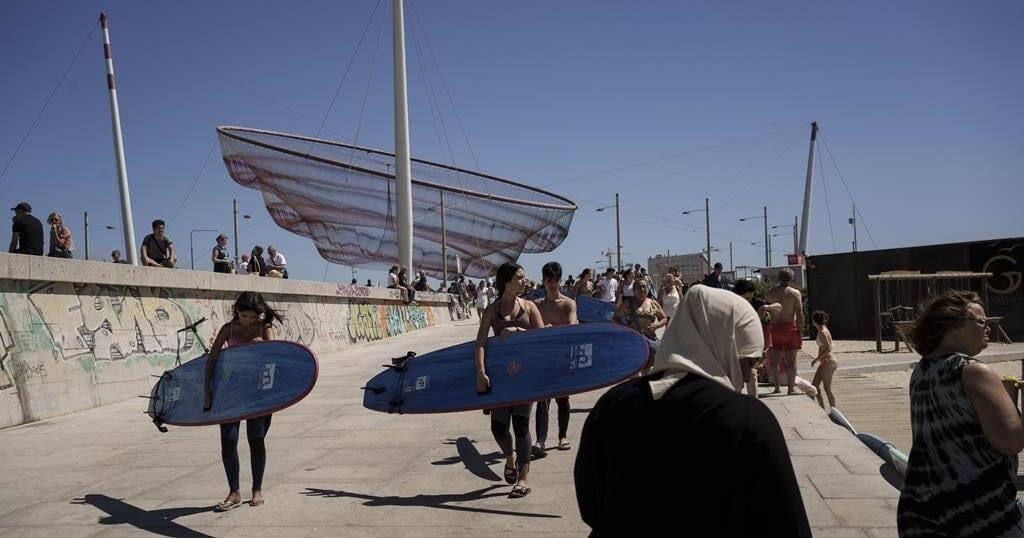PORTO, Portugal (AP) — Porto takes pride in its beaches, old churches covered in blue-and-white tiles and its famous port wine named after the city in northern Portugal.
It’s also home to a different kind of church — located on its beachfront suburbs along the Atlantic coast near a fishing town known for some of the world’s largest waves. Parishioners attend in boardshorts, T-shirts, flip flops — even barefoot.
They surf before they worship.
Surf Church was established by a Brazilian-born Portuguese surfer and ordained Baptist pastor to spread the Gospel in a once-devoutly Catholic country — and top surfing destination — where about half of young people today say they have no religion.
In less than a decade, it has grown from a few families to dozens of parishioners representing more than a dozen nationalities from across the world. Their motto: “ We love waves. We love Jesus.”
“When you’re waiting for the right wave it’s the calm before the swell, and that’s a peaceful moment that sometimes is seconds, sometimes minutes,” said the Rev. Samuel Cianelli, Surf Church’s pastor. “This peaceful moment is, for me, my deepest connection with God.”
On a recent Sunday, he wore a bright orange wetsuit — instead of traditional priestly vestments — and lay belly down on a surfboard on the powdery sand of Matosinhos beach to show young parishioners huddled around him how to paddle, “pop up” and catch a wave.
“I always loved waves, and when I see people learning how to surf, it makes my heart so happy,” said Uliana Yarova, 17, after she walked out of the same waters where — a week later — Cianelli baptized her and her brother in a joyous ceremony. They wore matching white T-shirts that read: “I chose Jesus.”
The Ukrainian teenager fled her war-torn country with her family after Russia’s invasion and found refuge in Porto and the Surf Church.
“When you’re paddling on the surfboard waiting for the wave, and you stand, you might start to doubt and feel like you’ll fall,” she said. “And then, when it goes right, you feel confidence and peace — you feel nature and how God is holding you on that wave.”
The church members — mostly Generation Z and millennials — walked in and out of the waters smiling, carrying red and turquoise surfboards branded with Surf Church stickers. Some sported tattoos of the cross — the only other visible sign that set them apart from other surfers who shared the waves.
In preparation for worship, they rinsed the surfboards and carried them to a white van that a few missionaries in bathing suits drove to nearby Surf Church.
Churches in Porto, Portugal’s second-largest city, include the majestic cathedral with its silver altar, the so-called “Chapel of the Souls” with its façade of thousands of illustrated white and blue tiles, and São Francisco, with its intricate wood carvings covered in gold dust.
Surf Church’s garage is instead painted with a mural of a gold-colored Volkswagen camper van with a blue surfboard strapped to its roof.
After surfing, sandal-wearing members of the church hung wetsuits next to a rack lined with boards. Some rinsed their feet with a garden hose or took a quick shower before they gathered to pray and sing in a cozy living room decorated with roof-hanging surfboards and a mural of surfers riding waves.
Church member Hannah Kruckels said she never felt as welcome attending a much larger traditional church in her native Switzerland. That changed when she arrived as an intern in 2020 to Surf Church, where she feels at home and where she learned how to surf.
“It’s an important part of spirituality to be connected to something bigger. In this case for us, it’s God, but it can be the ocean, too,” she said after a Sunday service that she attended with her Portuguese boyfriend, who is also a surfer. “That’s what makes surfing a spiritual experience.”
Surfing had religious significance in Hawaii, where it was born long before the arrival of Europeans.
“After prayers and offerings, master craftsmen made boards from sacred koa or wililili trees, and some had heiaus (temples) on the beach where devotees could pray for waves,” William Finnegan writes in “Barbarian Days: A Surfing Life.”
Men and women of all ages and from all social levels — from royalty to commoners — surfed. But when 19th century Calvinist missionaries arrived in the islands, they were appalled by what they believed was a barbaric spectacle and banned surfing.
It only reemerged decades later thanks to Hawaiians like Duke Kahanamoku, the Olympic gold medal swimmer who is regarded as the father of modern surfing.
Surfers were still “typecast as truants and vandals,” Finnegan wrote. Even in modern era, some beach towns banned surfing.
For long, surfing continued to be frowned upon as a counterculture movement or a mere pastime — and for decades it remained little-known outside California and Hawaii.
But the tides have changed. Surfing has spread across the globe as a professional and most recently an Olympic sport, as well a multibillion-dollar industry.
Portugal has emerged as one of the world’s top surfing destinations — home to some of the biggest waves for pros in the fishing hamlet of Nazaré and for uncrowded waves for beginners along the beaches near Porto.
“People from all over come to Portugal because they want to experience what the beaches of Portugal have to offer,” said Cianelli, wearing a loose shirt covered with designs of palm trees. “We found in this a good strategy to start a church that combines Jesus and surf.”
He grew up swimming competitively in the Brazilian port city of Santos, where soccer legend Pele played most of his career. After an injury kept Cianelli from competing at the age of 15, he took up surfing.
At the same time, he grew closer to his Christian faith. He attended seminary, was ordained and served as a youth pastor.
During a conference a 2013 in Brazil, he met Troy Pitney, an American missionary and surfer. They began to dream about planting churches in Portugal.
They wanted to use Portugal’s growing surf culture to attract members in the once fiercely Catholic country where religious practice is falling, especially among the young, while a rising wave of migrants from Brazil and other South American countries continues to plant evangelical churches.
After moving with their families to Porto, they launched Surf Church in April 2015. Their strategy was simple: catch waves and invite other surfers and beach lovers to read the Bible, sing and pray.
“We didn’t know what we were doing,” Cianelli said. “We just had a love for Jesus. We were all surfers.”
They began to meet in an apartment, and from 2016-2020 they worshipped at a gym near the beach, “just to break the concept of what church means,” Cianelli said.
“The building is about the people. You could be in the ocean, you could be at the beach, you could be inside of a gym or someone’s living room. Or now, where we are in the space that belongs to us. It doesn’t matter the place, what is important is the people — this is the real meaning of church.”
They were also intentional in their words: They still don’t use the word “igreja” — Portuguese for church — to avoid connotations of the cavernous spaces with emptying wooden church pews.
There’s plenty of “gorgeous, historical” church buildings in Porto, Cianelli said. He respects their historical role, but says that what his congregation seeks is a modern-day “living church made by people.”
The pillars of his church remain the same: surfing, community and the Bible. It took them nine years to go over the New Testament, word-by-word, and they’ve recently started with the Old Testament.
Their dream, he said, is to plant surf churches — or churches linked to mountain biking, soccer or any passion that brings people together in sport and prayer — across the world.
“We’re not just surfers anymore,” he said.
___
Associated Press religion coverage receives support through the AP’s collaboration with The Conversation US, with funding from Lilly Endowment Inc. The AP is solely responsible for this content.

























